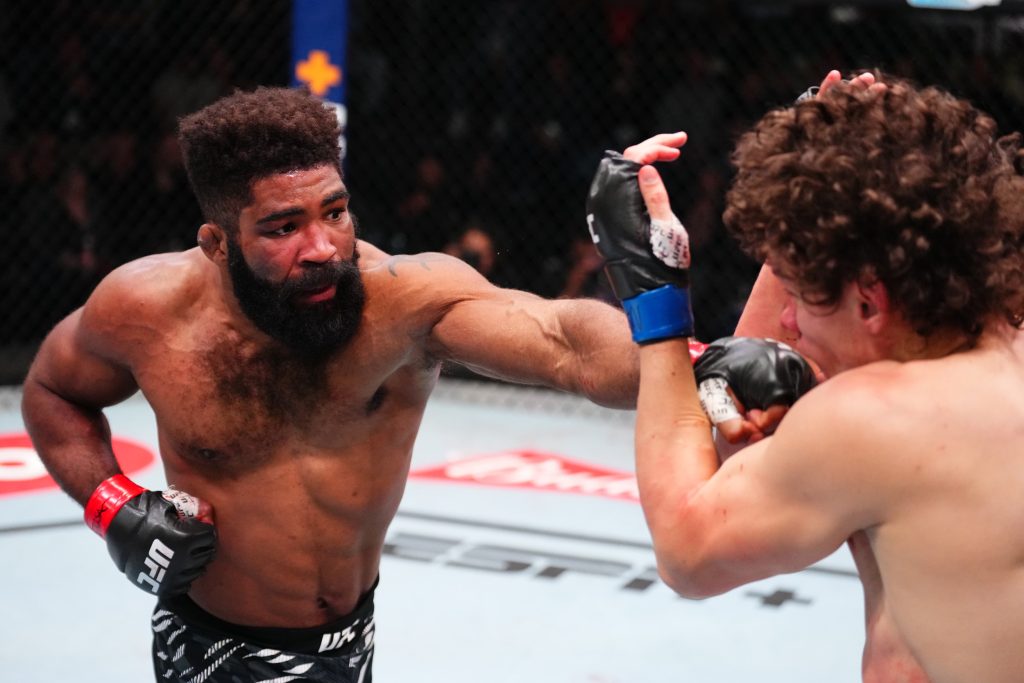The first UFC event of 2025 ignited a firestorm of controversy, centered around the middleweight clash between Roman Kopylov and Chris Curtis at UFC Vegas 101. The fight itself was a back-and-forth war of attrition, a testament to the grit and determination of both competitors. However, it was the final, fleeting seconds that etched this bout into the annals of controversial MMA finishes. With the clock ticking down to its final moments, a dramatic turn of events unfolded, leaving Curtis incensed and Kopylov celebrating a hard-fought, albeit disputed, victory.
Kopylov and Curtis engaged in a brutal exchange throughout the fight, each man absorbing and delivering significant punishment. The bout was characterized by powerful punches and unwavering resilience, leaving both fighters visibly marked by the intensity of the contest. As the fight progressed into the final round, the stakes were high, with the outcome hanging precariously in the balance. The judges’ scorecards revealed a deadlocked contest, each judge having scored one round apiece for each fighter. This meant the final round would be decisive, adding an extra layer of tension to the already electrifying atmosphere.
The final round mirrored the preceding two, a relentless display of striking prowess and unwavering determination. Both Kopylov and Curtis, fueled by adrenaline and the desire for victory, threw caution to the wind, searching for the decisive blow that would end the fight. Kopylov landed several powerful left hands that visibly staggered Curtis, putting the American on wobbly legs. Despite being noticeably shaken, Curtis, displaying the heart of a true warrior, refused to succumb. He rallied, firing back with his own powerful shots, pushing the increasingly fatigued Kopylov to his limits.
With the 10-second clapper signaling the imminent end of the fight, both fighters, sensing the urgency of the moment, stood toe-to-toe, engaging in one final, furious exchange. In a dramatic turn of events, Kopylov unleashed a surprise head kick that landed flush on Curtis’s chin. The impact sent Curtis stumbling backward, his legs giving way beneath him as he crashed to the canvas.
Instead of capitalizing on his downed opponent, Kopylov, perhaps sensing the gravity of the situation and displaying a measure of sportsmanship, mercifully refrained from delivering any further blows. However, referee Mark Smith, observing Curtis’s fall and apparent disorientation, deemed the fight over, waving off the contest with a mere single second remaining on the clock. The abrupt stoppage elicited an immediate and vehement protest from Curtis, who, despite being visibly shaken, clearly felt he was still capable of continuing. He argued his case with the referee, but the decision stood.
The controversial stoppage awarded Kopylov a last-second TKO victory, his 14th professional win and sixth in the UFC, propelling him to a victorious start to the year. For Curtis, the defeat was particularly bitter, having battled back from a nine-month injury layoff only to suffer a controversial TKO loss, his second such defeat in a 44-fight career. The veteran fighter was left to rue the referee’s decision as he made his way back to the locker room, the image of the last-second stoppage undoubtedly replaying in his mind.
The controversy surrounding the stoppage sparked heated debate among fans and pundits alike. Many questioned the timing of Smith’s intervention, arguing that Curtis, despite being visibly rocked, had not been given the opportunity to recover or demonstrate his ability to continue. Had the fight gone the distance, as it would have had a single second elapsed, the judges’ scorecards would have come into play, adding another layer of complexity to an already contentious outcome. With the judges’ scorecards revealing a tied contest, the fight would have either been declared a draw or potentially gone to a sudden death round, further underscoring the significance of the referee’s decision.
The debate surrounding the Kopylov-Curtis fight highlights the inherent complexities and subjective nature of refereeing in combat sports. The responsibility of protecting the fighters’ safety while simultaneously ensuring a fair and just outcome is a delicate balancing act. In this particular instance, Smith’s decision, though undoubtedly made with the best intentions, left many questioning whether he had acted prematurely, robbing Curtis of the opportunity to fight to the very end and potentially altering the course of the fight.
The controversy surrounding the Kopylov-Curtis fight serves as a stark reminder of the fine line referees must walk in combat sports. While the primary concern must always be the safety of the fighters, it is crucial that referees exercise judiciousness and avoid intervening prematurely, especially in closely contested bouts where the outcome hangs precariously in the balance. In this instance, the last-second stoppage left a lingering sense of injustice, leaving Curtis understandably frustrated and raising questions about the consistency and objectivity of refereeing in MMA.










